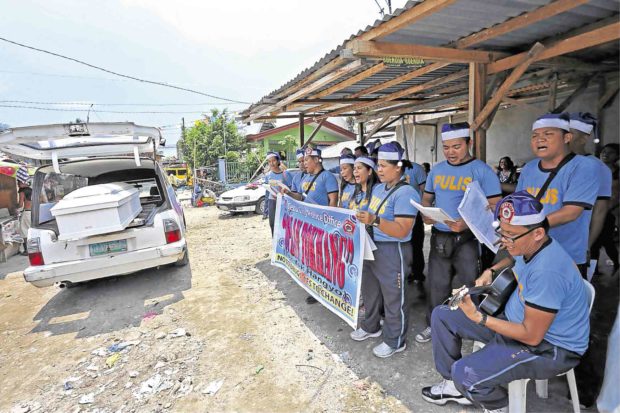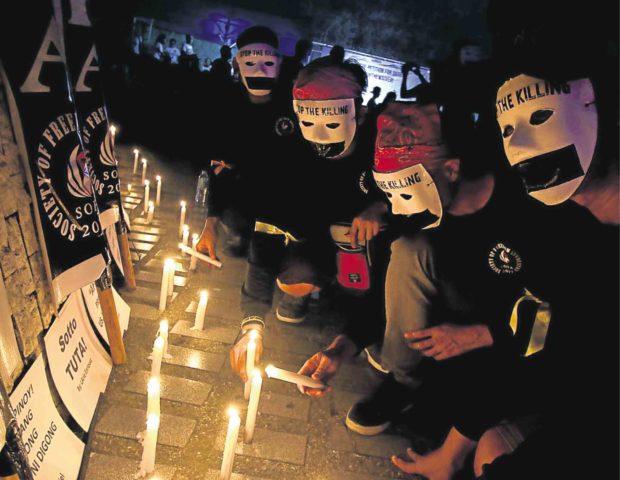Fears grow over kids using, selling drugs

Policemen conduct an “Oplan Tokhang” operation last year in the Cebu City village of Duljo Fatima where pushers use children as drug couriers. —TONEE DESPOJO/CEBU DAILY NEWS
CEBU CITY—The increasing involvement of children in drugs either as users or pushers could best be mirrored by the case of Loloy, a 15-year-old boy who had admitted he started using “shabu” (crystal meth) at the age of 10.
Loloy (not his real name) said he was hooked on the drug for at least two years. He not only used the drug, he also peddled it as a courier for a top drug suspect in the village of Duljo Fatima here.
He would deliver the drug to houses of users according to instructions by his boss.
Loloy has been sober for three years now, but his case was just one of hundreds in Central Visayas showing that the drug menace knew no age.
On July 1, 2016, when the war on drugs started just as President Duterte began officially wielding the powers of his office, up to 100,000 drug suspects surrendered to police in Central Visayas. Nearly 5,000 of them were children.
Article continues after this advertisementChild offenders
Article continues after this advertisementThe Central Visayas office of the Philippine National Police (PNP) counted 4,887 children among those who surrendered. Of this number, 4,827 admitted they used drugs. At least 46 admitted they sold drugs while 14 acted as couriers for drug syndicates.
The ages of the children were not immediately known, but the police record showed most were either in high school or out of school.
At least 4,760 of them were boys while 127 were girls.
The regional police record also showed Bohol had the most children involved in drugs (2,621).
Bohol was followed by Cebu province (1,740), Cebu City (247), Mandaue City (156), Lapu-Lapu City (104) and Siquijor (19).
According to police, since the start of the war on drugs on July 1, 2016, at least 428 children had been arrested in drug operations either for using or selling drugs. Of these, at least 218 were turned over to Second Chance Centers, facilities for child crime suspects being run by the Department of Social Welfare and Development (DSWD).

Parents bring children to a prayer rally in November last year in Quezon City seeking an end to summary killings of drug suspects. —INQUIRER PHOTO
Juvenile law
The Juvenile Justice and Welfare Act, which Mr. Duterte wants amended to lower the age of criminal liability to 12 years old, exempts from criminal prosecution and trial children aged 15 and below.
The same law provides that children aged 16 to 17 years old who commit crimes would be put through social welfare programs unless it was determined that they committed crimes fully aware they were doing so.
Chief Insp. Marylou Cuizon, head of the Central Visayas PNP’s Women and Children’s Protection Center, said authorities must seriously look into the involvement of children in the drug trade.
“It is a cause for concern,” she said, calling on parents to look after their children and make sure they stay away from drugs.
“There are actually parents who are remiss of their duties and responsibilities,” said Cuizon.
“We wonder why there are still children who are on the streets at past midnight. Are there parents not looking for them?” she said.
Parents’ role
Cuizon, who has four children, said parents played a key role in addressing the drug menace.
Lawyer Joan Saniel, executive director of the nongovernment organization Children’s Legal Bureau (CLB), said children involved in drugs should undergo rehabilitation and other programs to reform.
“We need to address this issue and it can’t be done by just making arrests or even killing persons,” said Saniel. “Proper intervention should instead be made if we want to save those kids,” she said.
Unfortunately, she said there was a lack of drug rehabilitation centers and other facilities for children hooked on drugs.
Msgr. Joseph Tan, media liaison officer of the Archdiocese of Cebu, said society needed to get its act together to save children from the drug menace. “Social conditions plus the reality of the vice itself, I suppose, are factors that drive children to use illegal drugs,” he said.